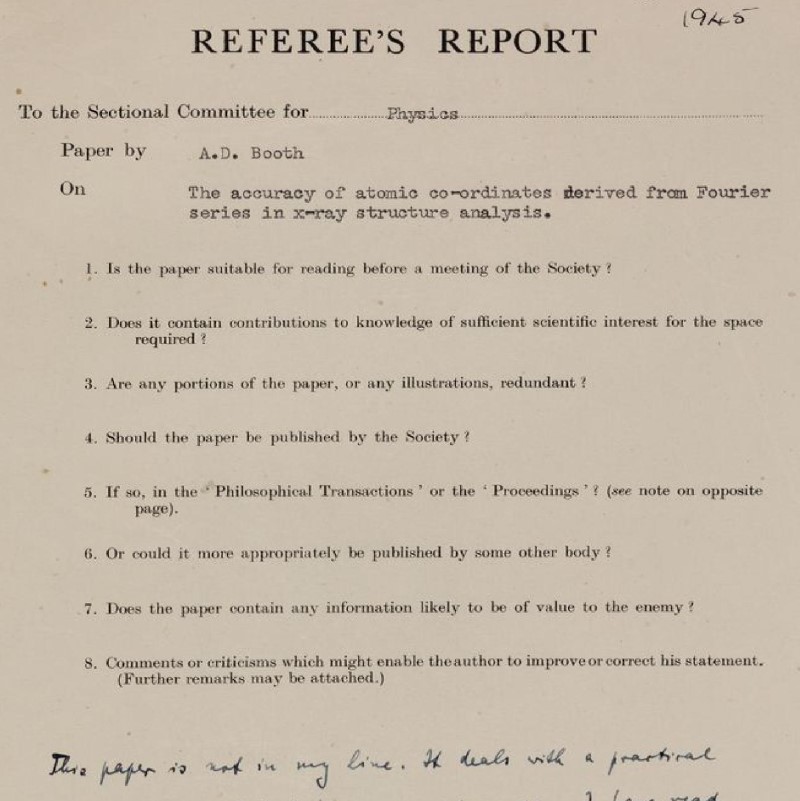Peer review is crucial to inspiring trust in science.

Here at the Royal Society, we understand that trust is an incredibly important element of scientific publishing. We recognise that trust in peer review is crucial to inspiring trust in science, and we also recognise that it is a vital ingredient for all parties involved in the publishing process. As ‘trust’ is the theme for this year’s Peer Review Week, we thought it would be the perfect opportunity to reflect on our own processes and practices, in order to demonstrate how we are doing what we can to support the scientific community.
Trusting the outcome: peer review, processes, and professionalism
‘Trust in Peer Review’ can be seen from a number of different angles. First of all, there is the need for trust in the scientific output. Scientific research has been in the spotlight in recent times, particularly during the COVID-19 pandemic, and questions have been asked about how readers can trust the science they encounter. The peer review process certainly plays a large part in this aspect of trust.
Secondly, there is the aspect of trust within the process – for authors and reviewers. Authors are giving publishers their research and trusting that we will process it in a timely and proficient manner, and with an aim to produce the best possible scientific record.
Reviewers provide a service to us, for free, because they trust that their valuable time will result in better published research. Operating a journal in a professional, fair manner is key to ensuring that authors and reviewers will continue to submit to that journal in future and, of course, to ensure high quality research output.
Rigorous review by practising scientists
At the Royal Society, the key to maintaining a high-quality process lies in our fantastic editorial teams. Each of our journals has a set of researchers, all experts in their respective fields, to oversee the papers that are submitted to us. Every journal works a little differently, but in all cases these active researchers will handle the papers themselves, or act in an advisory capacity. As practising scientists, who carry out research and publish their own work, they know exactly what authors and reviewers need.
Access to such a wide net of experts means that we can find the right reviewers for papers, thus ensuring that high quality reviews are received. Our editors play a large role in safeguarding authors, by ensuring that feedback is given in a polite, professional and constructive manner. They all receive training on avoiding unconscious bias to ensure that researchers who submit to our journals are treated fairly.
In-house editorial expertise
In addition to our expert advisors, each journal is managed by an in-house team of publishing professionals, who are responsible for ensuring that all submitted and published research passes through our checklist of strict requirements. This is to ensure that readers can trust the research that we publish. Requirements include:
- All research papers must include a data accessibility statement which allows readers to access the data behind the paper.
- All research must have been carried out in an ethical manner, and authors are required to provide details of how this has been done.
- Papers must not be plagiarised (we use tools to check this).
Our in-house editorial team plays a large role in ensuring that all papers are processed in a professional manner, for example by ensuring confidentiality to protect reviewers and authors.
They also provide day-to-day advice and customer service to our editors, authors and reviewers, as well as handle any difficult situations, such as retractions or disputes between authors and editors. Royal Society Publishing is a member of COPE so we have access to resources to help us to resolve any particularly difficult cases, should these arise.
Open peer review
If you would like to get a feel for how open peer review works, you can now view the review history on several of our journals. We publish the reports, decision letters and author responses from each step of the process alongside the final version. This helps readers to see what problems were flagged with the paper in earlier versions, and should help them to decide whether they feel that the final paper is trustworthy. This also provides an excellent resource for new authors and reviewers – it helps them to understand the process and also to understand that peer review is there to support and improve the science, rather than acting as a barrier to publication.
We hope that this blog post has helped you get a better idea of how we are here to help, and that you will submit your research to one of our journals, or review for us in the future. Our Six steps from submission to publication infographic is a quick and easy guide to the various stages of our publishing process.



